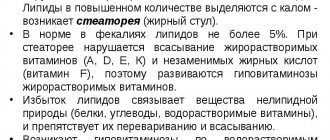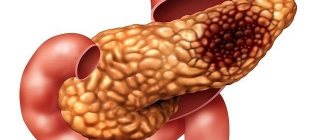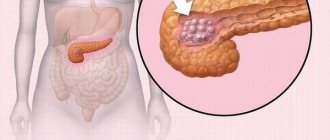If the pancreas does not work, the process of digestion and metabolism in the body is completely disrupted. This is due to the role that the gland plays: the digestion of food changes, and in parallel, the development of diabetes mellitus is possible. These diseases are severe, requiring constant dietary restrictions; in many cases, tablets are prescribed for the functioning of the pancreas for lifelong replacement therapy. If the recommended lifestyle and therapy are not followed, complications occur that have an unfavorable prognosis.
Functions of the pancreas
The pancreas is the largest gland in the human body. Due to the complex structure of tissues, it performs a dual function: exocrine and endocrine. The parenchyma of the organ consists of glandular tissue, which includes acini - the main structural units that produce pancreatic juice, and the islets of Langerhans, represented by 5 types of cells that produce hormones.
When endocrine function is disrupted, insulin production is most often caused by damage to the pancreas. This is manifested by symptoms of a disturbance in the functioning of the pancreas in the form of the development of diabetes mellitus - a severe disease that over time leads to life-threatening complications.
If the inflammatory process is expressed in the tissues of the pancreas, this leads to pancreatitis. Particularly dangerous is an acute process that causes massive death of pancreatic tissue - pancreatic necrosis. In such cases, if assistance is not provided in a timely manner, death occurs within a matter of hours.
What can cause this pathology?
Poor nutrition is the cause of pancreatic dysfunction
Most often, these similar symptoms of dysfunction occur with progressive chronic pancreatitis, when the secretory activity of the pancreas goes beyond normal limits. Other causes of dysfunction may be:
- The predominance of spicy, smoked, fatty, fried foods in the diet.
- Poor, irregular nutrition, deficient in vitamins and protein.
- Alcoholism.
- Deviations from the normal functioning of the liver and biliary tract (gallbladder stones, cholecystitis, biliary dyskinesia).
- Pathologies of the gastrointestinal tract (stomach and duodenal ulcers).
Any disturbances in the coordinated functioning of the digestive organs will, after some time, affect the functioning of the pancreas. If you have a predisposition to such diseases, you need to properly structure your diet, try to avoid psycho-emotional overload, and treat digestive disorders in a timely manner.
Alcohol is the main factor causing pancreatic dysfunction.
How can you notice pancreatic dysfunction?
If you pay close attention to your body, you can pay attention to changes in the functioning of the pancreas at the very beginning of their manifestation. If exocrine function is impaired, a person gradually loses appetite and becomes excessively tired even in the absence of heavy loads. And he also develops unmotivated weakness, growing lethargy, apathy, nausea, sometimes unstable stools (mushy or constipated), and bloating. The general condition worsens, there is constant discomfort from the digestive organs. Over time, the symptoms worsen, causing constant pancreatic diarrhea (liquid feces with a greasy sheen and a foul odor, mixed with undigested food residues - steatorrhea), rumbling in the stomach, nausea. In severe cases, with a sharp decrease in functions, vomiting occurs, which does not bring relief. These are symptoms of pancreatitis - a disease that requires treatment from the moment the first symptoms appear. According to statistics, men who abuse alcohol are more likely to get sick. Overweight women who do not limit themselves in diet and lead a sedentary lifestyle are also susceptible.
When a disturbance in the intrasecretory activity of the pancreas occurs, the first signs of its dysfunction can be noticed in both an adult and a child: a person begins to drink more water, he is bothered by dry mouth, constant thirst, frequent urination - polyuria (large amounts of urine) occurs. If you consult a doctor in a timely manner, without delaying the process, disorders are easily determined by several tests: elevated blood sugar is detected, and in severe advanced cases, glucosuria (sugar in the urine) is detected.
Complex of symptoms of dysfunction
The initial manifestations of this pathology can be mistaken for manifestations of other diseases, since there are practically no specific symptoms characteristic exclusively of this condition. Most of them relate to digestive disorders:
- Nausea and vomiting.
- Flatulence, rumbling in the stomach.
- Heartburn and belching. Alternating diarrhea and constipation.
- Frequent stools that have an unpleasant odor and leave greasy marks on the walls of the toilet.
- Chronic pain in the left hypochondrium, aggravated by errors in diet (consumption of fatty, fried, smoked foods), extending to the lower back.
- Sudden weight loss due to impaired metabolism and insufficient intake of food components into the body.
Chronic pain and lack of protein and vitamins in the body lead to a sharp decrease in immunity and symptoms associated with this condition: increased fatigue, decreased performance, general weakness, deterioration of hair and nails, and skin rashes.
How to make the pancreas work?
Your therapist will explain what to do to avoid a sharp decrease in the production of enzymes and insulin at your first visit. In the future, depending on the identified pathology, the patient will be treated by a gastroenterologist or endocrinologist. The specialist will prescribe treatment that will lead to an improvement in the condition if the patient takes the necessary drug correctly, without failures, in a timely manner and regularly. The dysfunction of the gland is normalized if the failure is detected in time, its cause is identified and recovery begins.
First of all, if a person feels unwell, but the examination does not reveal deep pathological changes in the tissues, no neoplasms or pronounced dysfunctions are found, the pancreas can be forced to work by following the correct diet. Usually, in the early stages, the consequences of organ dysfunction manifest themselves in decreased appetite, weakness, apathy, and general malaise, which is why the state of health progressively continues to deteriorate. During this period, it is important to maintain declining functions using different methods: not only by taking the prescribed medication, but by strictly following a diet, work and rest regimen.
This simple method should work if you regularly limit unhealthy foods, eat at exactly the same time every day, and eat in small portions and often. A proper diet and strict routine will lead to a significant reduction in the load on the pancreas and stimulate its work.
Treatment
To treat pancreatic dysfunction, you also need to see a therapist. If a disorder of pancreatic function is associated with impaired enzyme production, treatment is prescribed by a gastroenterologist. If the endocrine part of the pancreas is not working well, the patient will be observed by an endocrinologist.
The doctor evaluates the symptoms and prescribes treatment for the pancreas, which includes several components. The patient will have to follow a diet and take medications. In some situations, it is permissible to use folk remedies.
Diet food
Diet is one of the main measures in the treatment of pancreas. The goal of therapeutic nutrition is to reduce the load on the organ. Principles of diet for pancreatic dysfunction:
- exclusion of products that have a negative effect on the organ;
- eating small meals six times a day;
- You need to prepare food by boiling, stewing, baking;
- fried and smoked foods are prohibited;
- refusal to drink alcohol;
- if endocrine insufficiency is detected, limit sugar intake.
Careful adherence to the diet at an early stage of the disease allows you to minimize the use of medications.
Drug treatment
If the pancreas does not work, following a diet is not enough, what to do, the doctor will again tell you. The selection of drug therapy is carried out after a complete diagnosis, and treatment depends on the type of dysfunction. Drugs with different properties are used.
- The doctor recommends enzyme preparations when the gland does not produce enough of its own enzymes. The following medications are prescribed to be taken after meals - Festal, Mezim. The duration of treatment depends on the severity of the dysfunction.
- To relieve pain, antispasmodics are used - “No-shpa”, “Papaverine”, “Buscopan”. They are prescribed as a course for two weeks.
- In case of acute inflammation of the pancreatic ducts, enzyme preparations are contraindicated. Drugs that block the exocrine function of the organ are prescribed - “Gordox”, “Somatostatin”.
- If the problem is due to a lack of insulin, it is prescribed as a subcutaneous injection.
Drug treatment can only be prescribed by a doctor. Periodically you need to undergo tests and adjust treatment. The appearance of symptoms indicating pancreatic gland dysfunction is an indication to consult a doctor. Timely examination and treatment will prevent the dysfunction from progressing into a more serious disease.
The pancreas performs many important functions in the body. It produces hormones and pancreatic enzymes, which, as a component of gastric juice, take part in digestion. Pancreatic diseases lead to disruption of the digestive process and interfere with the breakdown and absorption of nutrients. This condition is characterized by certain symptoms, although at the beginning of the pathological process it is not always possible to accurately determine the presence of the disease without additional research. Pancreatic dysfunction needs to be confirmed using a number of diagnostic measures.
How to stimulate the organ?
The doctor will explain in detail how to properly stimulate the functioning of the pancreas in case of impaired functions. The pancreas is such a delicate and sensitive organ that any external or internal negative influences lead to massive death of its cells. Areas of the pancreas that die are not restored: they are replaced by connective (scar) or fatty tissue, which are not able to perform the normal functions of digestion and hormone production. With each subsequent pathological process in the gland, the amount of normally functioning parenchyma of the organ decreases, and the patient’s condition progressively worsens.
When you consult a doctor with the first signs of poor health, it is still possible to restore the partially changed activity of the pancreas. To do this you need:
- follow the diet prescribed by a specialist,
- change lifestyle,
- regularly engage in physical therapy,
- take drug therapy.
Together, this will improve the functions of the pancreas and the condition of the body as a whole.
Normalization of functioning
To restore normal functioning of the gland, it is recommended to completely change your lifestyle. First of all, this applies to alcohol consumption. It is one of the main factors leading to disruption of the organ. It is a toxin that causes damage to the blood vessels that supply nutrients to the pancreas. Lack of normal blood supply leads to the death of pancreatic cells. Alcohol also has a direct damaging effect on the cells of any organ, including the pancreas. For some people, drinking a small amount of alcohol-containing drinks is enough for acute pancreatitis to develop in a catastrophically quick time. The use of alcohol is especially dangerous for a patient with existing pancreatitis. In such cases, you need to give up even low-alcohol drinks.
It is recommended to drink enough non-carbonated alkaline mineral water. In the absence of contraindications, the doctor may prescribe 2-3 liters of water per day. This indirectly stimulates the functioning of the pancreas and helps the production of pancreatic juice. The amount and duration of mineral water intake is regulated by the doctor.
The patient should include regular moderate physical activity and therapeutic exercises in his routine. During exacerbations, intense physical labor is contraindicated.
Methods for stimulating the pancreas
If the disease is not advanced, treatment can be done without taking medications. The doctor will prescribe a specific diet, which should be strictly followed to prevent the development of the disease.
In cases with a verified diagnosis, medications are prescribed to stimulate the pancreas, which, depending on the impaired function, can make the organ’s activity normal. This is one of the effective methods if you strictly follow the recommendations.
If pancreatitis is detected, the patient should take enzyme replacement therapy. It is prescribed by a doctor: the selected drug is strictly dosed, since with high doses of external enzymes in tablet form, iron may stop producing them on its own. Taking a small dose of enzymes is needed to stimulate the body's production of its own enzymes.
For diabetes mellitus, glucose-lowering therapy is prescribed. If there is significant damage to pancreatic tissue, when insulin production has stopped, insulin replacement therapy is also prescribed. Without taking insulin, severe complications of progressive diabetes mellitus will quickly occur. Large doses are not prescribed so as not to disrupt the synthesis of your own hormone by the remaining intact cells.
In addition to basic replacement therapy, a number of drugs are prescribed that help reduce inflammation in tissues, reduce swelling during exacerbation, relieve pain and dyspeptic symptoms accompanying exacerbation. A significant improvement in the general condition due to the stimulation of organ activity, which leads to the normalization of all functions, explains why it is necessary to take the prescribed complex treatment.
Diet to improve organ function
To normalize the functioning of the organ, diet plays a paramount role. It is special nutrition within the framework of treatment table No. 5 according to Pevzner for pancreatitis (there are several options, taking into account the condition of the organ) and various formations in the gland, and table No. 9 for diabetes mellitus that can reduce pain and discomfort caused by disorders in the organ. This is explained by a decrease in the functional load on the damaged organ. Moreover, not only the quality of certain products plays a role, but the frequency and quantity of food eaten at one time. You need to eat 5-6 times a day in small portions at fixed times, with equal time intervals.
Fatty, spicy, fried and smoked foods are strictly excluded. When consuming this food, the gland requires a large amount of pancreatic juice with a high content of enzymes, as well as a long time to process harmful products.
If a dish is eaten in large pieces, chewing poorly, the load on the organ similarly increases: in order to digest a large piece, the secretion of the gland must also be increased. At the same time, a large amount of produced pancreatic secretion due to the inflammatory process can be retained in the ducts, not having time to quickly exit into the lumen of the small intestine. This is dangerous because enzymes enter the pancreas parenchyma and trigger the process of autolysis—self-digestion of the gland. The pathology worsens, the disease worsens, and the gland further reduces its functions.
The basis of nutrition for impaired pancreas function is porridge cooked in water, vegetable soups, for which you can use non-rich broths, mild low-fat cheeses, poultry, rabbit, beef, veal, and weakly brewed tea. The method of preparing dishes is important: the food is boiled, steamed, stewed, but not fried. Butter is limited; vegetable oil can also be consumed in limited quantities.
The same measures will help stop destructive processes at the onset of the disease. Since pancreatic pathology is often accompanied by dysfunction or diseases of the gallbladder, general recommendations must be followed to exclude the development of gallstone disease.
Carbohydrate intake in diabetes mellitus is sharply limited, sometimes completely eliminated for a while. This allows you to reduce the functional load on the organ and reduce the dose of glucose-lowering drugs (insulin).
For any pathology of the pancreas, fast food, dishes with large amounts of salt, sugar, juice seasonings, preservatives and other harmful additives are strictly prohibited.
Stimulation of organ function
How to make the pancreas work with the help of diets, medications and folk remedies?
Normalization of organ function occurs when foods containing a sufficient amount of enzymes and bifidobacteria are added to the menu, helping to normalize the digestion process. If there are not enough enzymes, then auxiliary preparations containing enzymes can be used.
Important information: Signs of pancreatic problems
Stimulation of the pancreas with folk remedies is carried out using medicinal plants. For example, these could be:
- Centaury grass. 1 tsp. raw materials are poured with 1 glass of boiling water and infused. Take ¼ cup of liquid 30 minutes before meals. The product facilitates the functioning of the organ, stimulates appetite and improves gland function.
- Freshly squeezed potato juice mixed with carrot juice, take on an empty stomach.
- You can make tea from clover, juniper root and fireweed.
- Decoctions of black elderberry and barberry support the functionality of the gland.
- Tinctures made from Schisandra chinensis, Rhodiola rosea and ginseng help a lot. They must be taken in courses.
- Propolis and mumiyo also have a beneficial effect on the functioning of the organ.
How to make the pancreas work using folk remedies?
The folk method of treating pancreas involves, first of all, the use of medicinal herbs: decoctions, infusions, tinctures. If the functioning of the gland is disrupted, the use of herbal remedies is prescribed for pancreatic pathology with extreme caution. The organ reacts to any irritating substance with the death of cells, which subsequently cannot be restored. Therefore, even to proven herbal components, if the functions of the pancreas are impaired, an allergic reaction may unexpectedly occur, which will intensify the pathological process and cause a cascade of tissue-destructive reactions.
It is recommended to use traditional recipes after consultation with a doctor. Some recipes are acceptable: for example, crushed buckwheat, poured with low-fat kefir in the evening - a good breakfast for pancreatitis and for diabetics. Rosehip decoction is also useful, which is allowed even for acute pancreatitis, before and after pancreatic surgery. Compotes made from dried fruits, fruit jelly and oatmeal are recommended - this has a healing effect on the gland.
To lower blood sugar, there are ready-made medicinal preparations in the form of teas (Arfazetine), but they are prescribed only by an endocrinologist, since they have contraindications and side effects.











